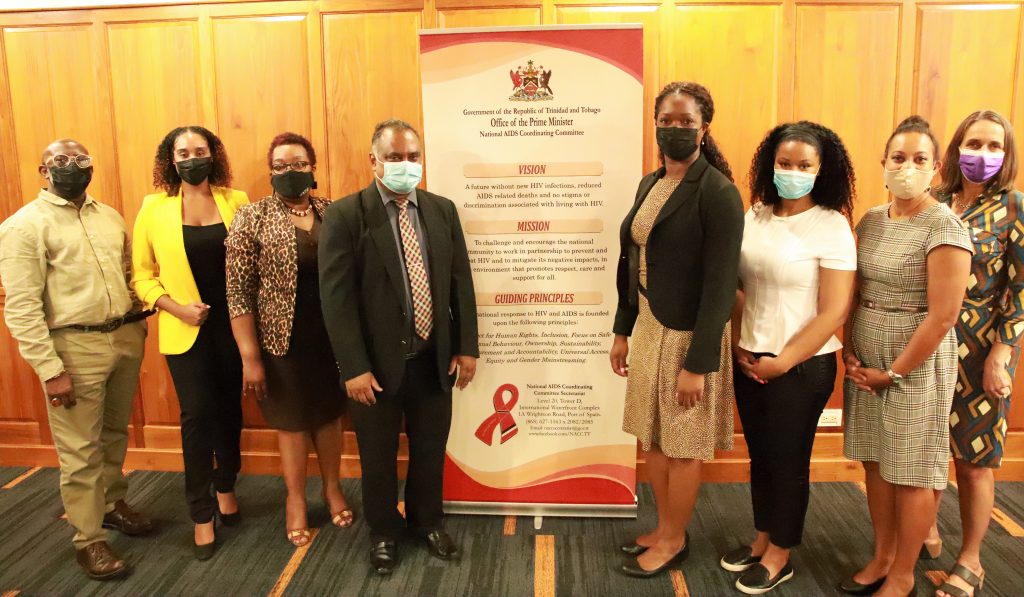
Recently, representatives from the International Training and Education Center for Health (I-TECH) met with health officials in Trinidad and Tobago to discuss potential areas of support for strengthening the national response to HIV and AIDS in the country.
The meeting attendees discussed strengthening advocacy for people living with HIV (PLHIV); psychosocial support for vulnerable PLHIV; and providing services at the intersection of HIV and AIDS and gender-based violence (GBV).
With support from the Health Resources and Services Administration (HRSA), I-TECH has worked in Trinidad and Tobago since 2009, collaborating with the Ministry of Health and other partners to focus on healthcare worker training and technical assistance to improve the quality of care for PLHIV.
“I’ve always been impressed with the team and activities in Trinidad and Tobago,” says Misti McDowell, I-TECH Program Director, “especially the integration of much-needed mental health services into the HIV program.”
The assessment “Strengthening Delivery and Oversight of Mental Health and Psychosocial Services for PLHIV in Trinidad and Tobago” was completed by I-TECH and shared with the National AIDS Coordinating Committee (NACC), in an effort to identify future areas of collaboration. One of the intended outcomes is the establishment of a technical working group of national stakeholders who will collaborate with I-TECH to craft a strategy for implementing all priority interventions.
“The findings of this assessment revealed that there is a tremendous need for improved mental health support specifically in the areas of assessment and treatment throughout the national HIV treatment and care sites,” says Belinda White, Clinical Psychologist with I-TECH. “One treatment and care site reported that as much as 90% of its client population experiences symptoms of mental illnesses.”
The most common mental illnesses encountered within treatment and care sites include depression, anxiety, bipolar disorder and schizophrenia; substance use disorder is also common within the PLHIV client population. A key area of interest is the integration of the Collaborative Care Model into the already existing treatment and care system, in a manner that incorporates the unique features of each site. The Collaborative Care Model is an evidence-based approach to treating common mental health conditions (e.g., depression, anxiety) in primary care settings and was developed at the University of Washington.
I-TECH also assisted the NACC with the establishment of the National HIV Helpline and will continue to provide support over the next six months, while working to transition the program fully to NACC. This includes support for the HIV Helpline Coordinator and Active Listeners, as well as training of new Active Listeners.
“We must continue fighting the stigma associated with living with HIV,” says Conrad Mitchell, Program Coordinator. “It’s important to continue to battle misinformation and to have that coupled with positive true-life experiences. The Helpline–manned by persons living with HIV together, with HIV NGO advocates and allies–provides a unique opportunity to combat misinformation though empathy and education in direct, one-on-one engagements with the public.”
A 2017 Inter-American Development Bank (IDB) National Women’s Health Survey for Trinidad and Tobago[1] showed that more than 30 percent of women in Trinidad and Tobago had reported having experienced at least one incidence of either physical or sexual partner violence. The NACC is seeking support related to GBV and the risks it poses to the health and well-being of PLHIV. Activities would focus on raising awareness and providing resources and psychosocial support for vulnerable groups.
“There is a lack of general knowledge about GBV and what it entails among the public as well as in some health care settings,” says Ms. White. “There is an opportunity to yield enormously positive results by increasing the knowledge and insight of health care workers, and people living with HIV, regarding GBV.
“My hope is that the information that is shared empowers people living with HIV to advocate for themselves if they come to the realization that they are experiencing,” she continues, “and to make contact with the local resources that are available to receive the necessary support.”
I-TECH will also seeks to help strengthen civil society organizations through enrollment in I-TECH-developed courses such as UW Leadership and Management in Health, Fundamentals of Implementation Science, Project Management in Global Health, Global Mental Health, and Policy Development and Advocacy for Global Health.
[1] https://publications.iadb.org/publications/english/document/National-Women-Health-Survey-for-Trinidad-and-Tobago-Final-Report.pdf